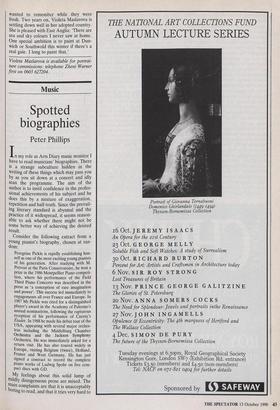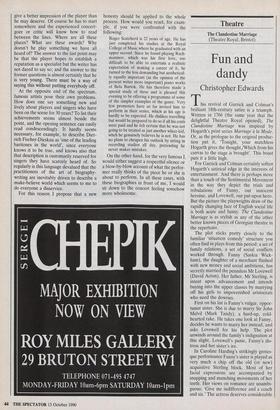Music
Spotted biographies
Peter Phillips
In my role as Arts Diary music monitor I have to read musicians' biographies. There is a strange subculture hidden in the writing of these things which may pass you by as you sit down at a concert and idly scan the programme. The aim of the author is to instil confidence in the profes- sional achievements of his subject and he does this by a mixture of exaggeration, repetition and half-truth. Since the prevail- ing literary standard is abysmal and the practice of it widespread, it seems reason- able to ask whether there might not be some better way of achieving the desired result.
Consider the following extract from a Young pianist's biography, chosen at ran- dom:
Peregrine Pickle is rapidly establishing him- self as one of the most exciting young pianists of his generation. After studying with M. Prevost at the Paris Conservatoire, he won a prize in the 1986 Montpellier Piano competi- tion, where his performance of the Field Third Piano Concerto was described in the press as 'a conception of rare imagination and power'. This success led immediately to engagements all over France and Europe. In 1987 Mr Pickle was cited for a distinguished player's award in the Academy of Palermo's annual nominations, following the rapturous reception of his performance of Czerny's Etudes. In 1988 he made his debut tour of the USA, appearing with several major orches- tras including the Middelburg Chamber Orchestra and the Jackson Symphony Orchestra. He was immediately asked for a return visit. He has also toured widely in Europe, visiting Belgium (twice), Holland, France and West Germany. He has just signed a contract to record the complete piano works of Ludwig Spohr on five com- pact discs with GD.
My feelings about this solid lump of mildly disingenuous prose are mixed. The main complaints are that it is unacceptably boring to read, and that it tries very hard to give a better impression of the player than he may deserve. Of course he has to start somewhere and the experienced concert- goer or critic will know how to read between the lines. Where are all these places? What are these awards? Why doesn't he play something we have all heard of? The answer to the last point may be that the player hopes to establish a reputation as a specialist but the writer has not dared to say so; and the answer to the former questions is almost certainly that he is very young. There must be a way of saying this without putting everybody off.
At the opposite end of the spectrum, famous artists pose their own problems. How does one say something new and lively about players and singers who have been on the scene for 30 years? To list their achievements seems almost beside the point, and the opening sentence can easily read condescendingly. It hardly seems necessary, for example, to describe Diet- rich Fischer-Dieskau as 'one of the leading baritones in the world', since everyone knows it to be true, and knows also that that description is customarily reserved for singers they have scarcely heard of. So regularly is this language devalued that the practitioners of the art of biography- writing are inevitably driven to describe a make-believe world which seems to me to do everyone a disservice.
For this reason I propose that a new honesty should be applied to the whole process. How would you react, for exam- ple, if you were confronted with the following:
Roger Scatcherd is 22 years of age. He has just completed his studies at the Royal College of Music where he graduated with an upper second. Since he found playing Rach- maninov, which was his first love, too difficult to be able to entertain a realistic expectation of making a career of it, he turned to the less demanding but aesthetical- ly equally important (in the opinion of the present writer more important) piano works of Bela Bartok. He has therefore made a special study of these and is pleased this evening to be offering a programme of some of the simpler examples of the genre. Very few promoters have so far invited him to perform in their series, which at his age is hardly to be expected. He dislikes travelling but would be prepared to do so if all his costs were paid and he felt certain that he was not going to be treated as just another whizz-kid, whch he genuinely believes he is not. He has no plans to cheapen his outlook by sitting in recording studios all day, pretending he never makes mistakes.
On the other hand, for the very famous I, would either suggest a respectful silence or a blow-by-blow account of what the perfor- mer really thinks of the piece he or she is about to perform. In all these cases, with these biographies in front of me, I would sit down to the concert feeling somehow more wholesome.



























































 Previous page
Previous page